Spanish artillery, key to NATO mission in Latvia

259 kilometres from Madrid, in the province of Burgos, is the Cid Campeador Military Base, where the 11th Field Artillery Regiment works tirelessly to fulfil the mission of the Field Artillery Command to which it belongs, which is to be trained and equipped to be used to reinforce the Field Artillery that is determined or within the framework of an operational organisation, as in this case, participating in a mission abroad.
It is precisely this artillery unit that has recently participated in the NATO mission NATO Enhanced Forward Presence-Latvia, an operation in which they have been deployed for almost five months with the objective of contributing to defence and deterrence in a defensive scenario.

Having just returned from Latvia, we spoke with the captain in charge of the Field Artillery Battery in the eFP X (enhanced Forward Presence) mission in Latvia, Luis Ventas, who told us about the Spanish Army's role there and highlighted Spain's great contribution to the mission, underlining the good image that the rest of the armies have of the Spanish army after they themselves stated that "the best battery that had passed through in all the rotations was the Spanish one".
What is your assessment of the work being done in Latvia, and does it set a benchmark for Spanish artillery?
This is the first time that an artillery battery equipped with a 155mm ATP howitzer and ARTHUR counter-battery radar has deployed on a NATO mission having executed fire actions in an area of operations.
This has logically been a step forward because from now on there is a specific mission abroad for the Field Artillery, which is a great opportunity. The Field Artillery joins the rest of the Spanish units that are deployed abroad.
The mission aims to maintain deterrence against aggression against our Baltic allies through a defensive deployment and responds to the Alliance's commitment to assist allied countries. There are four Battle Groups in the Baltic states and Poland. The Latvian Battle Group in particular is the most multinational, comprising up to 11 nationalities, with the recent addition of North Macedonia. Spain is the second largest force there after Canada.
Spain has three units deployed and both the engineer unit, the infantry unit, and we, the artillery unit, have demonstrated a high level of training. Therefore, the Latvia mission for Spain means a step forward in quality since 2017 and for the field artillery since 3 March, when we deployed.
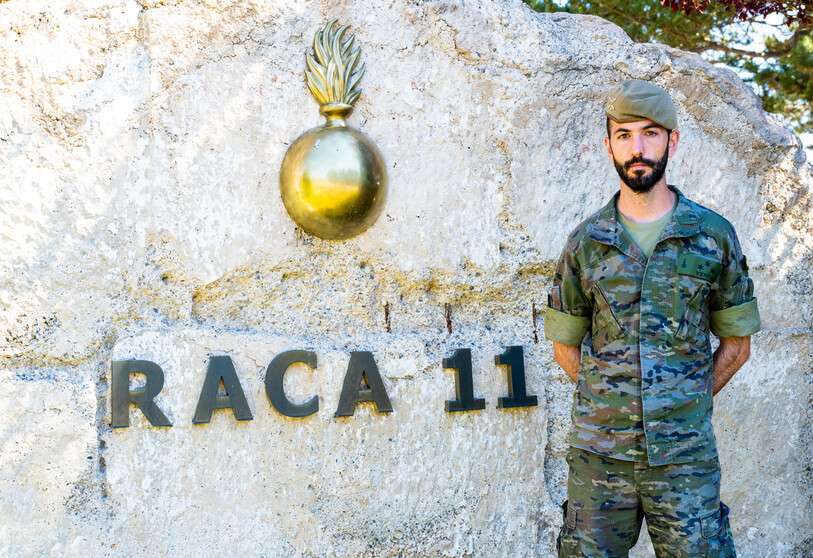
When you talk about deployment, what exactly did you deploy?
The mission prior to our deployment was made up of a mechanised tactical sub-group, which is an infantry unit made up of a company with Pizarro vehicles, mortars, anti-tank missiles and a section of Leopard tanks. This mechanised tactical subgroup, which is commanded by a captain, is very powerful and is probably the most capable unit in the region.
There is another Italian subgroup, there is another Canadian company, etc., but the Spanish subgroup is undoubtedly the most powerful. On the other hand, the engineer unit, which is only provided by Spain, consists of a section of sappers, plus a section of Czechs who are under the command of a Spanish captain. In addition, the mission has now been reinforced since March with the addition of artillery.
What is our battery made up of?
We have deployed six pieces, six M109 ATP howitzers on 155 mm chains with a range of around 20 km, although with extended range ammunition they would reach 30 km. The organic part of the battery is two Weapons Sections, with three pieces each. In addition, a Plan Section with topography and reconnaissance elements, and a Liaison Section with forward observers, the Arthur radar and a command post that served as a liaison detachment with the unit we supported.
It's a very powerful unit that provides extraordinary Battle Group capabilities. It is worth noting that we have deployed an Arthur radar for locating sources of fire and ballistic trajectories that organically belongs to the Information and Location Artillery Group II/63, also of the Field Artillery Command, which is based in León and which provides an extraordinary early warning capability to the troops. Tactically, this radar deploys and when an enemy shell is launched, the radar locates where it has come from, thus detecting the location of an artillery battery or a mortar section.
The Spanish battery undoubtedly adds value to the mission of deterrence and defence, if necessary.
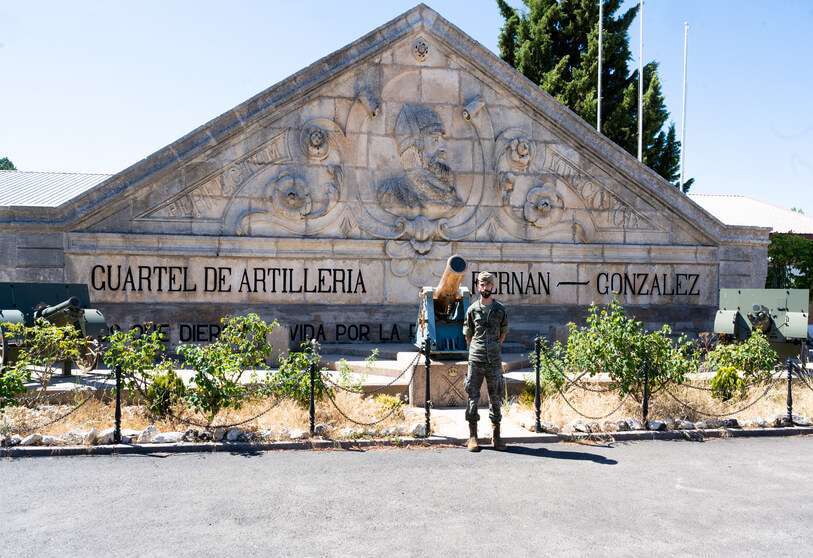
Within this mission, what changes has the Russian invasion of Ukraine brought about, and how have you noticed it?
For us, the mission has not changed at all. The mission since it started five years ago was deterrence and defence, and it has remained the same. Logically there was more concern from families because of the relative proximity. Spain took a step forward by reinforcing the capabilities we had deployed as a result of engagement with Alliance countries, but the mission as such has not changed at all.
There was no Russian move to threaten the mission?
Not at all. The mission did not change. The threat that existed from the beginning of the mission remained the same during the Ukraine crisis. We continued to do our work before the crisis started, during and when it ended.
What was your day-to-day work?
Our day-to-day work was the maintenance of the training and the operational training that was achieved, which is military language training, as well as the maintenance of the capabilities that were deployed. We also conducted training with other countries to form a combat unit to contribute to NATO's goal of deterrence along the eastern flank.
In addition, we conducted exercises and manoeuvres with all the countries that make up the multinational battalion in which we were embedded to refine our procedures so that we would be ready for combat at a moment's notice. When I got there during the first conversation I had with my boss, who was Canadian, he said "I want the battery ready for combat now". Those were the instructions I received. Once we received the material and prepared everything logistically, in less than ten days we were in the field ready to integrate with the rest of the units, which is done through exercises.
We have done a lot of exercises with many countries, we have deployed on the manoeuvre field and we have done a lot of shooting exercises. It hasn't changed at all, because in Spain we use NATO procedures. The only thing that has changed is the language: instead of speaking Spanish, we spoke English all the time. The observers and the command posts had to adapt to that, and we did it very quickly.
It has been a mission with a more NATO Article 5 character that has a more relevant consideration...
The Latvian mission has been in place since 2017, under the name "Enhanced Forward Presence", created after the Warsaw Treaties of 2016, with the objective indicated above of deterrence, so it cannot be included in a NATO Article 5 mission.
On 28 February 2022 we were ordered to deploy and we did so on 3 March with the first fifteen military personnel.
We were closer to combat there than we are here, but it's a question of being ready for it. Our job is still the same here as it was there. Motivation was higher because logically when you get short notice and you deploy, you are very motivated, but the mission doesn't change. Our goal is to be permanently combat ready.
Compared to other units from other countries that deployed at the same time, they took more than twice as long to be ready as we did. We managed to do it in record time because we have very good training and people are very prepared, that's a matter of day to day.
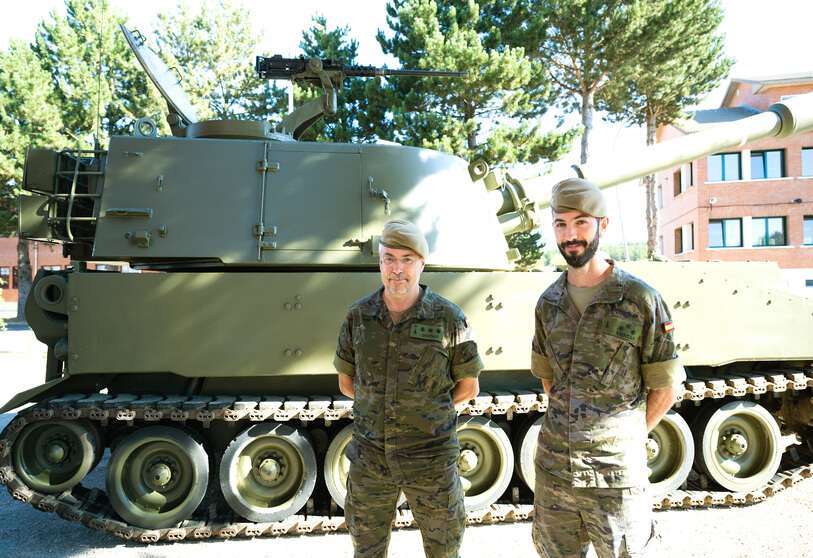
With the war in Ukraine in the background, what role is artillery as such playing?
Personally, it's not my job to monitor the conflict, so I don't know what role artillery plays there. However, in conventional combat, field artillery is the most powerful and decisive weapon that armies have. With artillery you hit targets and decide where the conflict can go, so it is certainly playing a key role in Ukraine.
Are the targets and firing coordinates digitised, and how do you select the firing and length?
In Spain, within the Field Artillery, we have a command and control system for fire support called TALOS, manufactured in Spain, which not only solves the problem of ballistic calculation but also manages all the procedures established in the doctrine. But it is not only a calculating system; the entire planning process is used. In this mission, of the eleven nationalities there, ours could be considered the best fire support command and control system.
How do you work with this system?
You plan targets on a map, you hit them in different phases and at the touch of a button you send them or refresh them at the command posts you want. So all the command posts have this information in real time, so if a target appears and they send me a request to fire, I can hit it instantly, because the data calculation is very precise.
In addition, this system is integrated through the ASCA protocol with other fire support command and control systems of allied countries, such as the United States and Canada, which are also deployed in the mission. Thus, the automatic exchange of information is now a reality. Spain validated this integration in the Dynamic Front exercise in 2021, carried out in Germany, where a GALCA I/63 Battery, also from MACA, managed to meet the milestones required for this validation.
Data are also calculated by hand at the same time, to always double check.
I understand that new technologies are a challenge for you because innovation and with new generations of systems, you need to be up to date with the latest training....
In the Army there is a constant concern to improve procedures and technological evolution in order to be more efficient with the resources we have. Technologically, we focus on the constant use of the fire support command and control system. Specifically, the Field Artillery Command is leading the evolution of the TALOS fire support command and control system. The 11th Field Artillery Regiment, in very close coordination with MACA Headquarters, is responsible for centralising all the processes for the development and improvement of TALOS, which is why we are fortunate to have military personnel with a special dedication to maintaining the evolution of the system for the benefit of the artillery community. This is both beautiful and demanding, because you can't stagnate. Things change from one month to the next, and those changes are what allow you to keep your people educated and up to date.
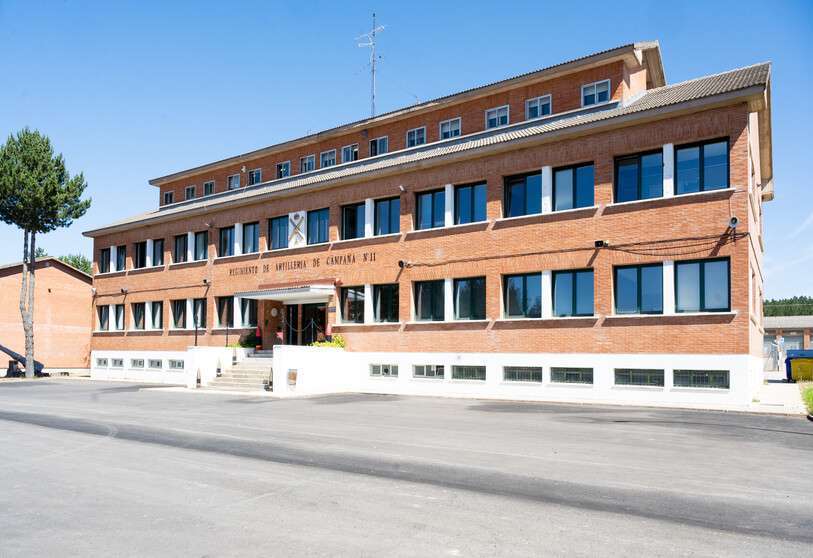
What recognition does Spain have in this NATO mission?
Fortunately for us, Spain had a very good name before we arrived. All the previous rotations in Latvia had done an excellent job. When I interviewed my bosses and colleagues, the Canadians told me that they were amazed by the professionalism of the Spanish soldiers, while the Slovaks said that the best battery that had been through all the rotations was the Spanish one. I passed this on to my people because it is a source of pride. The Spanish army has deployed high capabilities there and Spain's reputation is very high.
In addition to training, tactical competitions are held there and the participation records always belong to Spain, and we normally always win them. To give an example, there was an opportunity to participate in Poland, a fortnight before we came to Spain, as advanced observers. I sent a team of two observers and they came second in the whole competition in which twenty teams participated. My people had hardly prepared for the competition, while the Americans and other countries had been preparing for it for several months. By that I mean that our level of training is already very high in Spain and when we arrive in Latvia, they are surprised at how well the Spanish soldier does it.
As far as resources are concerned, I have to say that from my point of view, Spain has the most powerful capabilities with the Leopard tank, with the Pizarro, with anti-tank missiles, with mortars, with artillery batteries... In the end, Spain has contributed to Latvia with resources that are at the same level or even higher than those of the other countries.
The reality of the current situation after the Russian invasion of Ukraine gives a much better assessment of what it means to have competent, operational and effective armed forces. Do you feel more valued right now?
Nobody likes war, but the reality is that right now the situation is what it is and the threat exists. As early as 2016, it was decided to set up the Battle Groups. It is clear that we have to be there, and no one can do it for us. If Spain wants to ensure peaceful coexistence or day-to-day security, it is clear that the way to do so is to fulfil the commitments acquired with our allies and deploy with them. Deterrence is key in this situation.
The Colonel Commander of the Latvian brigade said to us every time he gave a speech, "Brothers in arms, I thank you that my family lives in freedom because of you". We are not only contributing to peace in Latvia, in this way we are also ensuring peace in Spain because we live in a global world.
Fortunately, we in the military feel valued by our society.
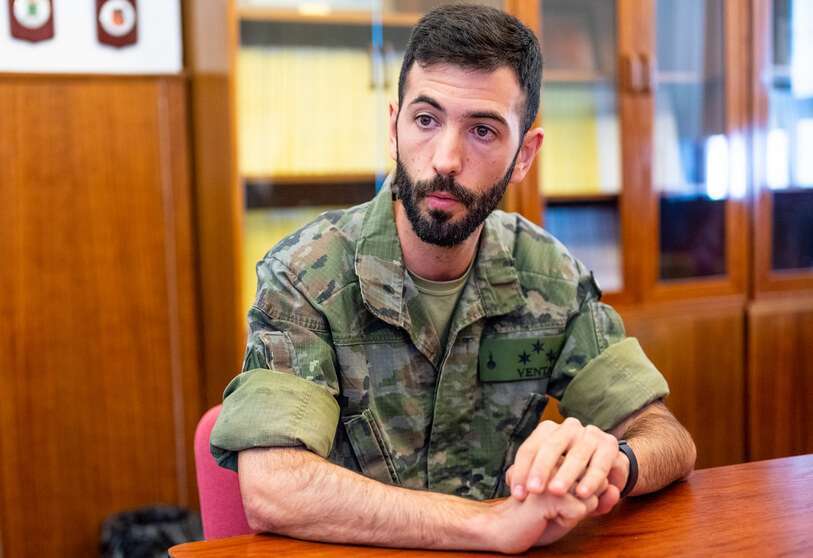
In other missions, such as Lebanon, there was a parallel civil-military congregation that brings to the Spanish mission the support and affection of the local population that is helped by the Spanish soldiers. Have you had this type of experience in Latvia?
The Latvian brigade has a department that is more about civil-military cooperation than communication, and we had a very important communication department within the Battle Group, because for the Latvians what was important was that people knew what was being done, that they knew that Latvia is now a safe country thanks to NATO and that the member countries have contributed to this security by sending troops and carrying out exercises.
In fact, every few years, there was a kind of open day in various towns in Latvia where Spanish soldiers went. For example, I have sent three vehicles to visit these towns, where posters were put up and activities were held with children so that people could learn about NATO's mission.
On the fifth anniversary of the mission, which was in June, there was a photographic exhibition in Riga for several days of everything the mission has done over the past five years. Everywhere we went, both in uniform and in the street, the people were very welcoming.
This civil-military cooperation to take food to a school in Africa, as the Air Force colleagues did recently, for example, does not happen there in Latvia. What we do is disseminate and communicate what we do in the mission.
What has the relationship with the families been like on this mission?
For us, it has been more demanding than difficult. For the families, I think more so, because we were given the order on 28 February and three days later we were there. Everyone was caught by surprise, but we knew that we had to react quickly to comply with the orders we had received.
The day my General gave me the order at ten o'clock in the morning, I arrived at my base at two o'clock in the afternoon and everybody was volunteering to go to Latvia. Besides, we didn't know anything else, we just knew that we were going to do what we were prepared for.
The families said no problem because they understand that it's our job and it's what we're preparing for, so everyone responded spectacularly. I think a big part of the success of the mission is because of the support from the families.
I personally have been very fortunate that my wife is in the military and she understands the situation perfectly.
The part of being there is hard, because you miss your family, but it's nice because you enjoy it and you are focused on the mission. Being here is difficult because you have your daily work, you take care of the family, you miss the people who are gone and you have time to think. In Latvia, I would call my wife and daughter at the end of the day, which was very late. I would have a quick dinner and call them, so I would disconnect from the mission three minutes before the call and then go to bed. I had no time to think. Here, you have more time for that. But thanks to the effort of the families, we have been able to accomplish the mission.
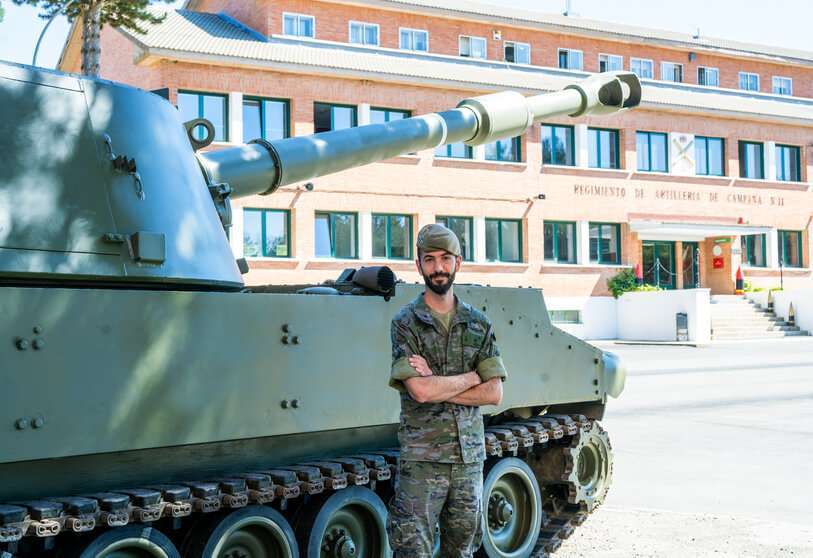
For us journalists, when you are in a conflict zone, you see the risks and the danger, but the families don't. In this sense, the role of the families is important. In this sense, the role of the media in providing accurate and rigorous information is important.
Yes, the role of the media in today's conflicts is increasingly important. At first it is true that you don't want to think about it, about that part of danger. In February, the news in Spain mainly followed the conflict in Ukraine and everyone linked it, despite the great distance between Ukraine and Latvia.
We were going to a country that is safe. What happened is that we went at a time when you didn't know how the situation could develop.
The reality in Latvia was quite different, since what was happening in Ukraine could not be extrapolated at all. It is true that Latvia borders Russia and we are there for a reason, but the Ukrainian conflict was a little far away.
The visit by the Minister of Defence, Margarita Robles, gave you visibility and security...
I understand that among other objectives, but it also served to underline Spain's commitment to peace together with its allies and, above all, to express our gratitude and close support for all the members of the eFP mission in Latvia.
We were also fortunate that the Minister was able to witness our first live-fire exercise as part of the established programme and thus to see on the ground our ability to contribute to deterrence in the Baltic countries. Her closeness reached every last one of us gunners who were there.
Earlier, a few days after we were all in Latvia, our Prime Minister also visited the Spanish contingent in Latvia. At the international level, we were visited by the head of NATO, Jens Stoltenberg, and the President of Canada, Justin Trudeau.
We carry out our mission independently of any situation, but logically, any support is welcome, but the military always works with the intimate satisfaction of having done its duty.
How are the meetings with the family afterwards?
In our case, despite the way the mission unfolded in terms of speed of response, thanks also to modern communications and the relatively short period of time we were on the NATO mission in Latvia, the meeting with the families afterwards was ideal, as there was no time to notice the physical separation we were exposed to.
The reunion was emotional in every way, as it could not have been otherwise, and this, together with the coincidence of the summer break, will mean that these months of separation will soon fade away.
On a professional level, what is your next challenge?
We now have a rest period and we will soon resume our activities. In addition, we have to reintegrate into the schedule of activities and exercises that our Artillery Group is involved in and we have a lot of training activities until the end of the year.
First of all, once we come back, we will redo the whole unit when we all join in. We have material that has gone to Latvia, so we will have to receive material from other units to match, so it will be a major logistical job, and then we will continue with our training and training objectives.
Personally, I hope to remain in my position as battery commander for the rest of my year in the Regiment, and next summer, due to the requirements of my career profile, I will have to change my posting.








